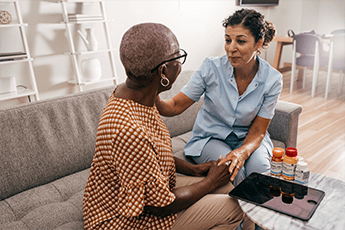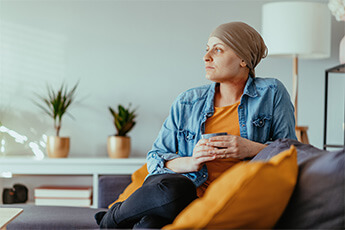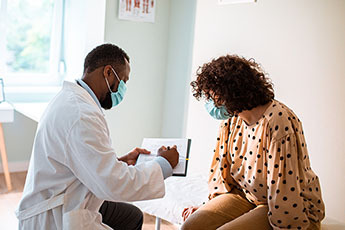Coping with fatigue from kidney cancer
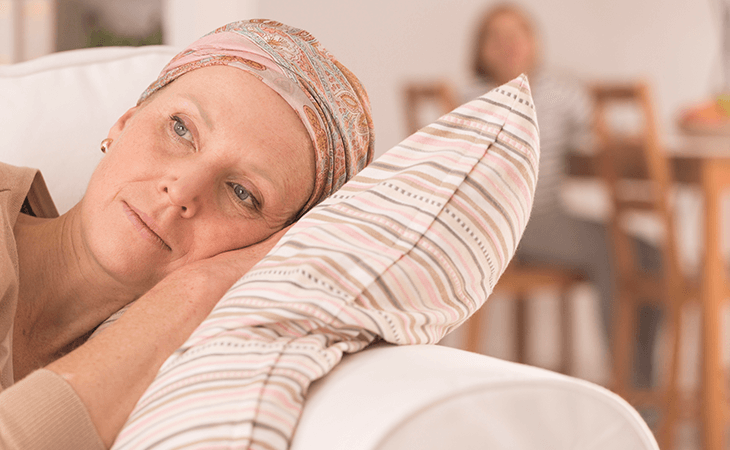
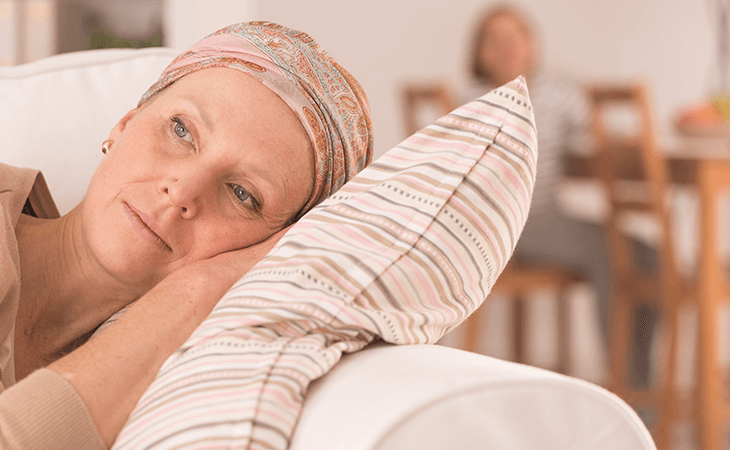
Feelings of extreme tiredness, or fatigue, are a sign of kidney cancer. Fatigue can also be a side effect of certain kidney cancer treatments. While everyone feels exhausted now and then, the fatigue that occurs when you have cancer is different. It can be debilitating, interfering with your ability to socialize, work, and enjoy life. Most people feel more energized when they get more sleep or take a break from their hectic lives. But when you have cancer-related fatigue, these solutions rarely help.
From the community: “My husband has had a tumultuous spring, and summer, and not unlike others on these sites, found out suddenly that he had a tumor in his R kidney and stage 4 kidney cancer…He has just completed his first cycle of Sutent and currently in the rest mode for 2 weeks. His labs were good and his side effects were rather mild compared to the experiences of many who develop more problematic side effects. The fatigue was his most pressing issuet which became more pronounced during weeks 3 and 4. He did develop taste changes where everything tasted like "cardboard" and he had a metallic taste in his mouth the last week…” – Inspire member
What is kidney cancer-related fatigue?
Cancer-related fatigue is a common complaint among people diagnosed with kidney cancer. The American Cancer Society estimates that at least 80% of people with cancer (and perhaps all of them) experience some level of fatigue.
Cancer-related fatigue goes beyond the usual feelings of tiredness. Signs of kidney cancer-related fatigue include:
difficulty remembering things, including how to do routine tasks
feeling of heaviness or lack of motivation and energy that impedes your ability to go to work, attend school, or complete daily tasks
inability to sleep or feeling exhausted after a good night’s rest
loss of muscle strength (weakness) that makes it difficult to get around and complete basic tasks like walking to the bathroom or brushing your teeth
mood changes like irritability, anxiousness, depression, or negative thinking
trouble concentrating, focusing, or paying attention
From the community:“Half two in the afternoon and i cant keep my eyes open. Wont go to sleep though, as dont sleep much at night anyway. Wish i could sleep at night, but as soon as i get into bed my brain goes on overdrive. Thinking about too many things that you have no time to think about during the day. There should be a switch, so you can turn your thoughts off. That would be brill.” – Inspire member
What causes kidney cancer-related fatigue?
Fatigue may be more of a problem if you have metastatic kidney cancer that spreads outside the original kidney tumor. Having more cancerous cells in your body can overwhelm healthy cells that typically give you energy. Treatments that destroy cancer cells can also damage healthy cells, contributing to fatigue.
Here are other reasons why you may feel so exhausted:
Anemia: People with kidney cancer are more prone to anemia, or low levels of red blood cells. These blood cells carry oxygen to your brain, organs, and tissues to give your body energy. Cancer treatments like chemotherapy can also lead to anemia.
Polycythemia: Polycythemia vera (PV) is the opposite of anemia. It causes an overabundance of red blood cells. PV occurs when cancer cells cause your kidneys to make too much erythropoietin. This hormone stimulates your bone marrow to make too many red blood cells. If you have polycythemia, you may feel fatigued and weak, struggle to breathe when lying down, and sweat profusely at night.
Lack of appetite: Cancer and cancer treatments can affect your taste buds and your appetite. An enlarged cancerous kidney tumor can put pressure on your stomach, making you feel full even when you eat little. You need proper nutrition to fuel your body.
Pain: Kidney cancer can cause side, back, or stomach pain that makes it difficult to eat and get the rest your body needs. Pain medications like opioids can alleviate pain, but fatigue is a common side effect.
What kidney cancer treatments can cause fatigue?
Kidney cancer treatments can also sap your energy. For instance:
Immune checkpoint inhibitors: Immunotherapy boosts your immune system, helping it to target and destroy cancer cells. Unfortunately, fatigue is a common medication side effect. This treatment can also cause diarrhea, which can contribute to a loss of appetite.
Radiation therapy: Fatigue from radiation therapy typically starts a few weeks after you begin treatment. You may need this treatment if you can’t get surgery to treat kidney cancer (a nephrectomy). Doctors also use radiation therapy to treat metastatic kidney cancer that spreads to bones or other organs, causing pain. This treatment-induced fatigue may get worse as you continue treatments. When treatments stop, the fatigue should gradually lessen.
Targeted therapy: You may get targeted therapy after surgery to lower the chances of the cancer coming back (cancer recurrence). Targeted therapy can cause anemia, nausea, and loss of appetite, which contributes to fatigue.
Chemotherapy: Chemotherapy isn’t a top treatment for kidney cancer. But you may receive it if immunotherapy and targeted therapy stop working. Chemotherapy can cause mouth sores that make it painful to eat. You may also have nausea and vomiting, diarrhea or constipation, and fatigue-causing anemia.
From the community:“I have stage 4 kidney cancer and I have started a new chemo treatment optdivo. I have some side effects and Im very tired. Has anyone ever been on it before? What were your side effects? How well did it work or not work? Im feeling kind of alone.” – Inspire member
What are the complications of cancer-related fatigue?
Chronic fatigue can increase your risk of other problems like:
depression, anxiety, or other mood disorders
relationship issues
social isolation
weight gain due to lack of physical exercise
work or school performance issues
What are ways to cope with cancer-related fatigue?
You may find yourself having more pep after finishing cancer treatments and treating underlying problems like anemia or pain. But some people have chronic cancer-related fatigue. If fatigue negatively affects your life, your doctor may suggest ways to manage it, like:
Exercise: Studies show that physical activity can be energizing — even when you don’t feel like moving. Going for a walk outdoors and breathing in fresh air can be especially invigorating. Research also indicates that practicing yoga twice a week helps people with cancer feel less fatigued and improves sleep.
Massage and meditation: Meditation and massage therapy can lower stress levels and anxiety, helping you sleep better.
Mental health counseling: Approximately 2 in 10 people with cancer develop depression, which can make you feel lethargic. Chronic fatigue also contributes to depression. Participating in psychotherapy with a mental health professional can be helpful. This expert can determine whether depression or another problem is causing the fatigue. They can also provide strategies to help you manage fatigue.
Nutrition counseling: A nutrition expert like a dietitian can help you manage treatment side effects like nausea and diarrhea that affect your appetite. This specialist may also recommend vitamins or electrolyte drinks to prevent malnutrition and dehydration.
Palliative care: Palliative care specialists help people with chronic illnesses like kidney cancer manage fatigue and other symptoms. These experts provide services aimed at improving your quality of life. Your hospital or cancer center can connect you with a palliative care specialist. Or a mental health provider or social worker may be able to help.
Sources
Kidney cancer signs and symptoms. American Cancer Society. February 2020.
Loss of appetite. American Cancer Society. February 2020.
Low red blood cell counts (anemia). American Cancer Society. February 2020.
Managing fatigue or weakness. American Cancer Society. February 2020.
Tests for kidney cancer. American Cancer Society. February 2020.
What is fatigue or weakness? American Cancer Society. February 2020.
Chaou A, et al. Randomized trial of Tibetan yoga in patients with breast cancer undergoing chemotherapy. Cancer. September 2017.
Fatigue. Kidney Cancer Association.
Loss of appetite. Kidney Cancer Association.
Depression (PDQ®)—Patient version. National Cancer Institute. July 2019.
Fatigue and cancer treatment. National Cancer Institute.
Cancer-related fatigue. Yale Medicine.
Disclaimer
Member comments are lightly edited for length and to remove identifying information but are otherwise reproduced as they appear in the community as part of public posts.
This content is for general informational purposes only and does not necessarily reflect the views and opinions of any organization or individual. The content should not be used as a substitute for professional medical advice, diagnosis, or treatment. Please consult your healthcare provider about any questions you may have regarding a medical condition.


